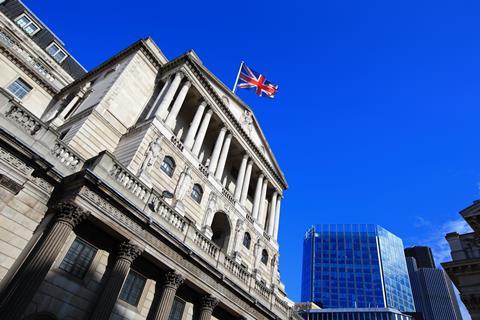Better than expected inflation data cheers market ahead of rate-setting meeting as listed housebuilder shares spike 6%
Shares in major housebuilders leapt as much as six per cent this morning in early trading as the release of better than expected inflation data prompted speculation over tomorrow’s crucial Bank of England rate-setting meeting.
In the wake of the latest inflation data which showed an unexpected fall in August price growth to 6.7%, speculation has increased that the Bank of England could pause its previously widely expected move to increase the base rate to 5.5% when its Monetary Polic Committee meets tomorrow.

The base rate is a key determinant of the price of mortgages – the rising cost of which are widely seen to have driven the recent weakness in the market.
Following the news, the value of Taylor Wimpey, Persimmon and Bellway all peaked initially at more than six per cent above yesterday’s closing price, with Barratt rising 5.7%, before all settling down at between four and five per cent up.
The Bank of England base rate is currently 5.25%, following 14 consecutive rises over the last 18 months as the Bank has attempted to get on top of rising inflation. Real-world mortgage rates, which are based on mortgage lenders’ anticipation of future Bank of England rates, have already started falling back slowly in recent weeks, but remain high, with both five- and two-year fixed rate deals still running on average at above 6%, according to Moneyfacts.
Kallum Pickering, senior economist at Berenberg Bank, said the inflation data would be “welcome news” for policymakers at the Bank of England but meant the outcome of the interest rate meeting tomorrow was “on a knife edge”.
He said: “The market for overnight index swaps, which had dramatically cut its bets for the peak bank rate in recent weeks from a high of 6.5% in early July […], has now lowered its bet on a further final 25bp hike to a c50% chance from a virtual certainty yesterday.”
>> See also Hundreds of mortgage options pulled as fixed mortgage rates rise
>> See also Why hybrid products are key to meeting our nation’s housing ambitions
Likewise, Sky News’ economics editor Ed Conway tweeted that the money markets had reduced their expectations of a quarter point rise in interest rates tomorrow from around 80% yesterday to around 55% today.
Ben Thompson, deputy CEO at Mortgage Advice Bureau, said: “Significant month-on-month falls [in inflation] ramp up the likelihood that the Bank of England will hold off on increasing rates right now.
“This will likely be a breath of fresh air for those on variable rates or trackers, especially if this means that interest rates are near, or at, their peak.”
Likewise, Simon French, chief economist at investment bank Panmure Gordon, called for the Bank to hold off from raising rates again. “With a range of other relevant indicators also telling the Bank of England to pause for breath, we think anything else at the September MPC meeting would have the hallmarks of a policy mistake,” he said.
According to trade body UK Finance, there are around 1.3m outstanding residential mortgages on tracker or variable rates that would be immediately affected by any rates rises, accounting for 16% of the mortgage market.
The speculation comes after the Home Owners Alliance earlier this week called on the Bank to stop raising interest rates, with the cycle of constant rates rises leaving “millions of homeowners bearing the brunt of the economic policy to battle inflation”.
Paula Higgins, HOA chief executive said the rises were “devastating” and an “attack” on homeownership. She said: “This needs to stop now. Raising rates from 5.25% to 5.5% would mark the highest level since 2007 and will leave homeowners open to even longer periods of misery.
The news came as the government released the latest official UK house price figures for July, showing prices rose in the month by 0.5%, taking annual growth to just 0.6%, its lowest for over three years. The figures continue a recent trend of the official government data, which includes cash buyers as well as those purchasing with a mortgage, being somewhat stronger than that reported by mortgage lenders.
The figures showed prices are £2,000 below the house price peak reached in November 2022.











No comments yet